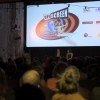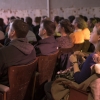The Taste of Sin | Offscreen
Religion was often scorned in European genre cinema, particularly during the social and sexual upheaval of the 60s and 70s. Exploitation cinema pushed depictions of sex and violence further and further, challenging censors and to some extent reducing taboos associated with the Catholic Church. In some films we find priests and nuns overcome by the very lustful, sexual impulses they seek to repress. In many gialli (Italian thrillers), often the priest would be revealed as the murderer. From this perspective, directors acted as representatives of religion through their sacrilegious filmmaking, using fiction to avenge religion's firm hold on their freedom of expression.
In The Confessional, Pete Walker, the pope of British sexploitation and horror, attacks priests as dangerous, sexually-repressed psychopaths. Here a clergyman grows depravedly obsessed with a young woman who comes to him for confession.
The Lady of Monza, is one of the first nunsploitation movies, an off-shoot of the genre dedicated to life in the convent. A sisterhood of nuns are physically tortured and satiate their carnal desires. This is the second film by Eriprando Visconti, nephew of Luchino Visconti and creator of the scandalous 70s-era film La orca.
The Confessional
A sexually-repressed village priest's obsession with a fragile, teenage parishioner turns ugly when he exploits the young woman's confessions for blackmail and even murder. A horrific thriller stigmatizing the depravity of a corrupt clergyman.
La Monaca di Monza
A murderer on the run seeks refuge in a convent, only to turn Mother Superior and her charges into slaves of vice, complete with lesbian rituals and unpunished rape. A rarely-screened nunsploitation set to music by Ennio Morricone and shot by the nephew of the director of The Leopard.








